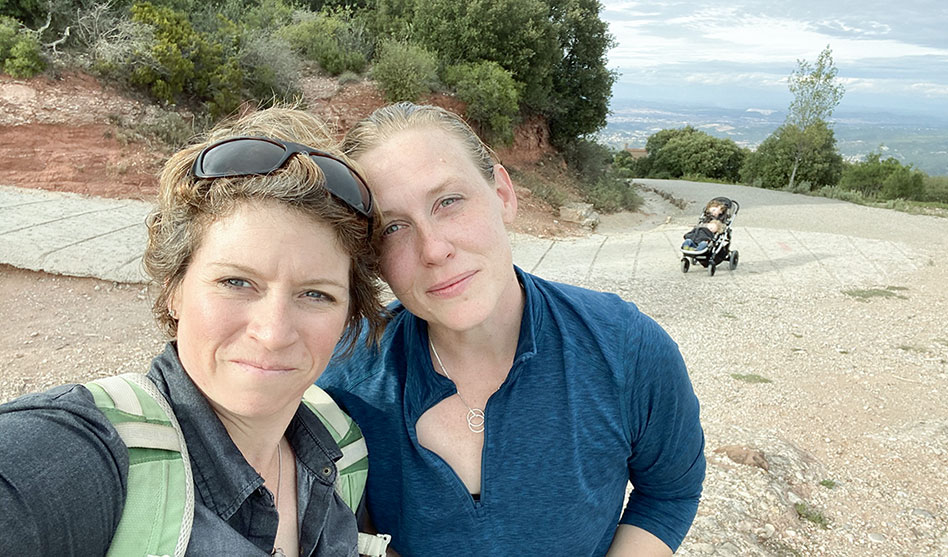Megan and Suzanne Bauer
Children’s Health hospital asks same-sex parents for biological parents rather than parents with decision-making rights
DAVID TAFFET | Senior Staff Writer
taffet@dallasvoice.com
When her son was sick, Megan Bauer contacted her pediatrician who told her to take him to Children’s Health in Dallas. The doctor forwarded records so mother and son were expected in the emergency room.
But when Bauer checked in, the woman doing intake asked if she was the biological mother.
“I asked her why she was requesting that information,” Bauer said, and the woman responded, “I see there are two women listed here. Are you the biological mother?”
Bauer said the woman wasn’t asking the question of anyone else.
Heterosexual couples get divorced and remarried to others, and the biological mother doesn’t always have custody. And adoptive parents have the right to make medical choices for their children, not those adopted children’s biological parents.
So, Bauer said, the question that should be asked of anyone bringing a child to the ER is, “Do you have legal authority to consent to care for this child?”
Bauer asked how knowing if she was the biological mother was relevant. When the woman couldn’t answer her, Bauer asked to speak to her manager.
That manager, she said, “explained that it was standard practice to ask people if they are the biological parent. But again, he could not explain the reason” for the question.
So Bauer spoke to his supervisor.
“She told me that this complaint has been raised to her and above her, and there was a decision to persist asking parents their biological relationship to the child presenting in the ER for care,” Bauer said.
In an informal survey of LGBTQ parents who are members of Rainbow Roundup on Facebook, no parents had been questioned differently at Children’s Hospital in Plano. But some who had taken their children to Children’s in Dallas had similar experiences.
Staci Dean is one of those parents who had the same thing happen to her.
“Yes. Even called my wife to consent treatment,” Dean wrote. “I’m like — I gave birth to this baby, and both of our names are on the birth certificate.” And, Michelle Salazar said, the hospital staff “asked what my wife was to our daughter.”
Meghan Leonard said she and her wife “had to provide a birth certificate and adoption paperwork before they would see our son in the ER.” For Deb Doyle, it happens “Every time. This is why I keep my boys’ adoption documents and their birth certificates on my phone.”
 Chauncee Taylor said the hospital staff “actually tried to refuse to allow me to sign my son’s paperwork for surgery because ‘you are not the biological parent so you cannot consent.’”
Chauncee Taylor said the hospital staff “actually tried to refuse to allow me to sign my son’s paperwork for surgery because ‘you are not the biological parent so you cannot consent.’”
Taylor explained, “I am on my son’s birth certificate, and we conceived him together. However due to being a same-sex couple they knew one of us was not biologically related. I even asked them, ‘If I was a man, would you have asked the same question? Because there are step-parents all the time that bring children in. Do you question them?’ They had no answer to that and admitted it would not have been questioned.”
But Bauer had an answer for that question: As she waited for her son to be seen by a doctor, she noticed that heterosexual couples were not being asked if they were the biological parents of the child they were bringing in. And some of those parents might be adoptive parents or step-parents or parents who used IVF — just like same-sex couples.
Dr. Julian Escobar, an IVF fertility specialist who has used the procedure with his husband to conceive their children, said reading about these parents’ experiences is “so triggering, as this is a fear we have had since before our kids were born.”
From the responses, we know it’s usually a family with two moms that are asked if they’re the biological parent. Dads in same-sex relationships seem less likely to be asked. Lerone Landis, who has a daughter with his husband, said he was asked no questions when he brought their daughter to the Children’s ER.
We also know that the hospital is not finding out if the adults presenting at the ER with a child have a right to consent for treatment, although a biological parent may not have that right. And with IVF, a birth mother, who automatically has that right unless there’s an adoption, may not be the biological mother.
After Dallas City Councilman Omar Narvaez spoke to Bauer, he contacted the hospital’s government relations liaison. “She said she would investigate, and make sure Megan was contacted,” Narvaez said.
Because of HIPAA, the liaison said they couldn’t share anything else with Narvaez, who said he explained to Bauer the city’s Fair Housing public accommodations nondiscrimination policy and complaint procedure.
Dallas Voice asked Children’s Health why hospital staff is asking about a biological connection of lesbian mom to her child rather than if the mom has a right to consent to treatment. Here’s their response:
“The health and safety of our patients is our number one priority. Upon arrival at our emergency rooms, parents and/or legal guardians are asked questions to verify their ability to legally consent to their child’s care. We actively review and train our team members on these procedures to uphold equitable and inclusive treatment for all the families we’re privileged to serve while safeguarding our patients’ privacy.”
Bauer responded to Children’s Health’s statement saying she believes the hospital has a procedure in place that requires admission staff to ask, “Are you the biological parents?”
“Multiple staff members explicitly told me the night I was there that this was an established, required procedure,” she said. “Also, I was explicitly told that despite complaints, the directive to continue this practice had come from higher ups, possibly from the board level.”
Bauer again stressed that being the biological mom doesn’t give her automatic right to consent to care, which is the important piece of information the hospital does need. “Based on their continuation of this practice despite complaints, I think it’s clear that there is an intent to discriminate against the LGBTQ families,” she said.
She also questioned why the hospital would be collecting this unnecessary data that “they have no right to collect … . It does not directly indicate the legal ability to consent to care, so other than offending people, what is the purpose of persisting in improperly collecting this data?”


Eventually, asking the wrong questions will result in someone giving consent who is not authorized to give it and the hospital will be sued.
Having to pay an expensive judgment in a lawsuit is the only thing that fixes institutional bigotry.